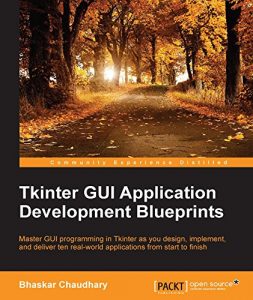Master GUI programming in Tkinter as you design, implement, and deliver ten real-world applications from start to finish
About This Book
- Conceptualize and build state-of-art GUI applications with Tkinter
- Tackle the complexity of just about any size GUI application with a structured and scalable approach
- A project-based, practical guide to get hands-on into Tkinter GUI development
Who This Book Is For
Software developers, scientists, researchers, engineers, students, or programming hobbyists with basic familiarity in Python will find this book interesting and informative. People familiar with basic programming constructs in other programming language can also catch up with some brief reading on Python. No GUI programming experience is expected.
What You Will Learn
- Get to know the basic concepts of GUI programming, such as Tkinter top-level widgets, geometry management, event handling, using callbacks, custom styling, and dialogs
- Create apps that can be scaled in size or complexity without breaking down the core
- Write your own GUI framework for maximum code reuse
- Build apps using both procedural and OOP styles, understanding the strengths and limitations of both styles
- Learn to structure and build large GUI applications based on Model-View-Controller (MVC) architecture
- Build multithreaded and database-driven apps
- Create apps that leverage resources from the network
- Learn basics of 2D and 3D animation in GUI applications
- Develop apps that can persist application data with object serialization and tools such as configparser
In Detail
Tkinter is the built-in GUI package that comes with standard Python distributions. It is a cross-platform package, which means you build once and deploy everywhere. It is simple to use and intuitive in nature, making it suitable for programmers and non-programmers alike.
This book will help you master the art of GUI programming. It delivers the bigger picture of GUI programming by building real-world, productive, and fun applications such as a text editor, drum machine, game of chess, media player, drawing application, chat application, screen saver, port scanner, and many more. In every project, you will build on the skills acquired in the previous project and gain more expertise.
You will learn to write multithreaded programs, network programs, database driven programs and more. You will also get to know the modern best practices involved in writing GUI apps. With its rich source of sample code, you can build upon the knowledge gained with this book and use it in your own projects in the discipline of your choice.
Style and approach
An easy-to-follow guide, full of hands-on examples of real-world GUI programs. The first chapter is a must read as it explains most of the things you need to get started with writing GUI programs with Tkinter. Each subsequent chapter is a stand-alone project that discusses some aspects of GUI programming in detail. These chapters can be read sequentially or randomly depending upon the readers experience with Python.






